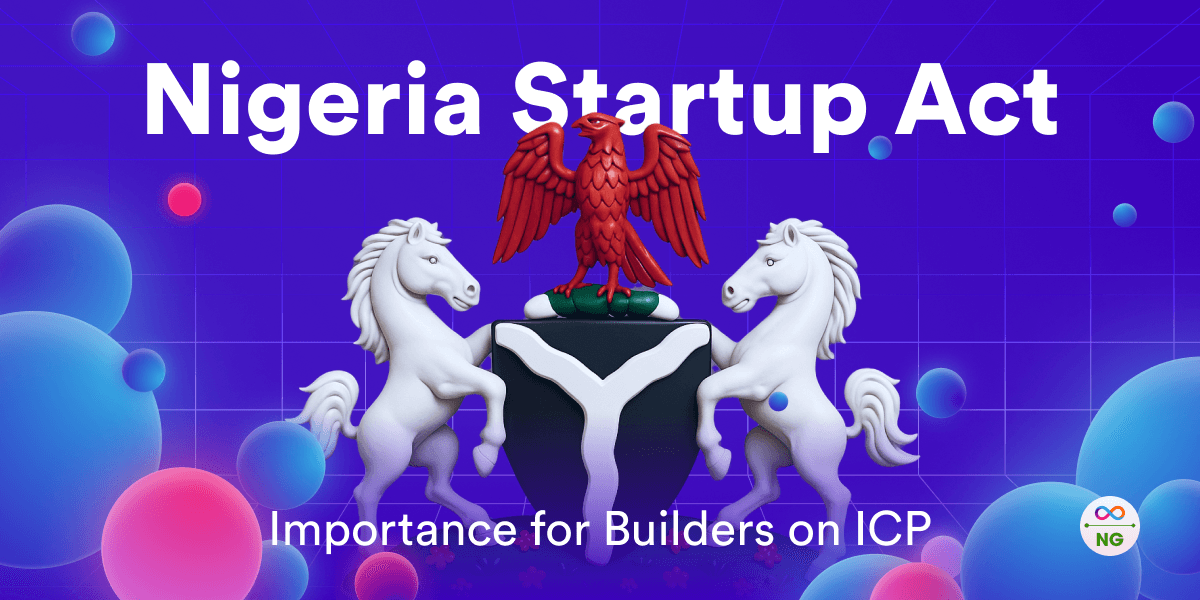
Building a startup in Nigeria today means navigating both the promise of innovation and the reality of regulation. For many founders and developers, especially those working with cutting-edge technologies like the Internet Computer Protocol (ICP), it can often feel like you're creating in a system that doesn't fully understand what you're building. This challenge was formally acknowledged on October 19, 2022, when President Muhammadu Buhari signed the Nigeria Startup Act into law.
The Act aims to provide a legal and institutional framework for the development of startups in Nigeria, positioning the country's startup ecosystem as a leading digital hub in Africa.
That’s exactly why the Nigeria Startup Act (NSA) matters. The government attempts to meet innovators halfway, offering a framework that supports startups, encourages responsible innovation, and provides legal clarity in a rapidly evolving tech space. If you’re building anything on ICP, this is one piece of legislation you can’t afford to ignore.
What is the Nigeria Startup Act?
The Nigeria Startup Act is a piece of legislation aimed at creating an enabling environment for tech-enabled startups to thrive. It recognises the importance of innovation in the digital economy and establishes a framework for government support, access to funding, tax incentives, talent development, and regulatory clarity.
The Act also introduces the Startup Label, a form of official recognition for eligible startups, granting them access to a suite of benefits that are critical for growth and sustainability.
These benefits include prioritised access to government-funded incubation hubs, participation in regulatory sandbox programs, tax relief for early-stage companies, and structured dialogue with regulators to resolve compliance challenges. For blockchain innovators and developers on ICP, these provisions could mean the difference between struggling in a policy vacuum and scaling with structured support.
Why is This Important for Builders on ICP?
If you’re building a startup on ICP in Nigeria, you’re doing more than writing code, you’re shaping a future-facing business in a complex policy environment. The decentralized nature of ICP, with its unique architecture that allows full-stack apps to be built entirely on-chain, presents a transformative model for startups. However, without aligning with local regulations, even the most groundbreaking solution can face operational or reputational roadblocks.
The NSA offers a path to legitimacy and growth for startups navigating unfamiliar regulatory terrain. For instance, projects on ICP focused on finance, healthcare, data management, or identity could fall under regulatory scrutiny if they’re perceived as unregistered financial service providers or platforms handling sensitive data without clear compliance protocols.
The Act helps mitigate these risks by providing a platform where innovators can proactively engage with regulators, gain access to legal support, and shape future policies through feedback mechanisms built into the Act’s framework.
Key Opportunities for ICP Startups Under the NSA
One of the strongest advantages of the Nigeria Startup Act is its regulatory sandbox initiative. This allows innovators to test products, services, or business models in a controlled environment with regulatory oversight. For a Web3 or blockchain-based startup on ICP, this sandbox could serve as a space to demonstrate how decentralized applications meet security, privacy, and compliance standards without immediately facing the full weight of regulation.
Moreover, the Act encourages collaboration between startups and universities through funding, R&D support, and innovation challenges. ICP’s model of on-chain smart contracts (canisters), autonomous operations, and decentralized governance fits well within such collaborative settings, especially in building educational platforms, verifiable credentials, and research repositories.
Tax incentives under the Act are also particularly beneficial for early-stage ICP startups. With cost being one of the major hurdles for blockchain projects, especially in Nigeria’s high-inflation economy, having tax relief can free up resources to focus on development, marketing, and user acquisition.
Practical Steps to Leverage the NSA as an ICP Innovator
First, ensure your startup is registered with the Startup Label Program under the Nigeria Startup Act. This process requires your business to be incorporated, tech-driven, and no older than ten years. Once labeled, you gain access to exclusive government-backed resources and engagement opportunities.
Second, consider how your application aligns with the priority sectors mentioned in the Act, such as fintech, healthtech, agtech, and edtech. These are areas where the government is particularly keen on supporting innovation and where blockchain-powered solutions can thrive.
Third, engage with the startup support and regulatory bodies outlined in the Act. This includes the Startup Investment Seed Fund, the Startup Support and Engagement Portal, and the National Council for Digital Innovation and Entrepreneurship. Being visible and involved in these platforms gives you early insights into funding opportunities, policy shifts, and collaborative initiatives.
Finally, document your startup’s compliance journey and user impact. As blockchain startups often face public scepticism around trust and utility, clear documentation, transparency, and user-focused metrics can help you stand out both to investors and regulators.
Conclusion
For developers and founders building on the Internet Computer Protocol, this is an invitation to innovate responsibly and strategically. The Nigeria Startup Act is more than a piece of legislation, it is a signal that the country is ready to engage with innovation in a structured and meaningful way.
It’s not just about creating next-gen dapps or decentralized infrastructures, it’s about aligning them with national growth goals, solving real problems, and accessing the kind of support that enables long-term sustainability.
If you want to win in Nigeria as a Web3 builder, especially on a protocol as forward-thinking as ICP, understanding and leveraging the Nigeria Startup Act should be part of your blueprint. It helps you operate with confidence, gain visibility, and scale within a system that’s finally catching up to the future you’re helping to create.